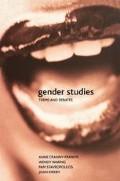Abstract
We prefaced this study by reference to Ursula Le Guin’s novel The Left Hand of Darkness (1981), a science fiction novel set on a world called Gethen. The indigenous inhabitants of Gethen spend most of their time in a state described by one observer as ‘manwoman’ — without a specific gendering — and once a month enter a sexual phase (kemmer) in which they adopt the primary sexual characteristics of one gender only. While this novel has since been criticised in many ways (for example its failure to include same-sex couplings in the kemmer period), it nevertheless remains a powerful interrogation of contemporary gendering. The field notes of Investigator Ong Tot Oppong note that:
When you meet a Gethenian you cannot and must not do what a bisexual naturally does, which is to cast him in the role of Man or Woman, while adopting towards him a corresponding role dependent on your expectations of the patterned or possible interactions between persons of the same or the opposite sex. Our entire pattern of socio-sexual interaction is nonexistent here. (Le Guin 1981, p. 85)
Preview
Unable to display preview. Download preview PDF.
Copyright information
© 2003 A. Cranny-Francis, W. Waring, P. Stavropoulos, J. Kirkby
About this chapter
Cite this chapter
Cranny-Francis, A., Waring, W., Stavropoulos, P., Kirkby, J. (2003). Conclusion. In: Gender Studies. Red Globe Press, London. https://doi.org/10.1007/978-0-230-62916-5_7
Download citation
DOI: https://doi.org/10.1007/978-0-230-62916-5_7
Published:
Publisher Name: Red Globe Press, London
Print ISBN: 978-0-333-77612-4
Online ISBN: 978-0-230-62916-5
eBook Packages: Palgrave Social & Cultural Studies CollectionSocial Sciences (R0)

